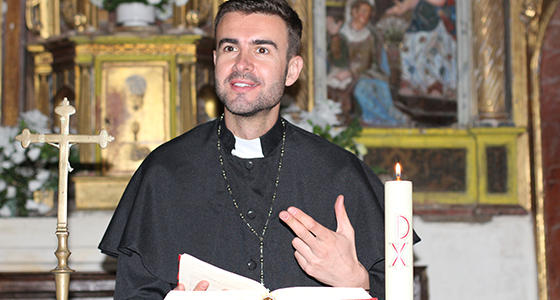The Place of Scripture in the Life of the Church
One modern distortion stands out in our approach to revelation: our preference for the written word over (and even to the exclusion of) the spoken word. Another modern distortion is that we think of books as private rather than public. As Mary Mills explains in her commentary on Ecclesiastes, “in the modern world much reading is a private matter in which, through the possession of literacy skills, one individual engages with a text in a direct and personal manner.” The combined effect of those two distortions is that we conflate Scripture and revelation and then think of Scripture as something primarily “personal” rather than communal.
But that’s not how the early Christians, or the Jews before them, thought of Scripture. The Law, and the Old Testament more broadly, was read in a liturgical context. God ordered a full reading of the Law to be proclaimed in its entirety every seven years, assembling “the people, men, women, and little ones, and the sojourner within your towns, that they may hear and learn to fear the Lord your God” (Deut. 31:12). Contrasting the Mosaic Law with the laws of other nations, the first-century Jewish historian Josephus explains that “every week men should desert their other occupations and assemble to listen to the Law and to obtain a thorough and accurate knowledge of it, a practice which all other legislators seem to have neglected.” We get a glimpse of this in Luke 3:16-21:
And [Jesus] came to Nazareth, where he had been brought up; and he went to the synagogue, as his custom was, on the Sabbath day. And he stood up to read; and there was given to him the book of the prophet Isaiah. He opened the book and found the place where it was written, “The Spirit of the Lord is upon me, because he has anointed me to preach good news to the poor. He has sent me to proclaim release to the captives and recovering of sight to the blind, to set at liberty those who are oppressed, to proclaim the acceptable year of the Lord.” And he closed the book, and gave it back to the attendant, and sat down; and the eyes of all in the synagogue were fixed on him. And he began to say to them, “Today this Scripture has been fulfilled in your hearing.”
Notice the little details. Jesus doesn’t crack open his pocket Bible, because such a thing doesn’t exist yet. Instead, he is handed a book, which he hands back at the end. And the book he’s handed isn’t a full Bible (or even a full Old Testament), because again, such a thing doesn’t exist yet. The Jewish Scriptures were kept on scrolls, with long books broken into more manageable parts (as we see with the books of Samuel, Kings, and Chronicles). When it says Jesus opened Isaiah, the verb there is anaptussó, “unrolled.” He’s opening a scroll and must then find his place. Early Christians pioneered the shift from scrolls to codices (an early form of books), but the expectation is still that Scripture is to be read communally and liturgically. The book of Revelation opens with blessings upon him “who reads aloud the words of the prophecy,” as well as upon “those who hear” (1:3).
In other words, Scripture anticipates being read (and listened to) publicly, rather than being read privately in, say, the living room or den. Why? Partly the reasons are practical, surely. For one thing, ancient texts have “little or no division between words, sentences, or paragraphs, and little or no punctuation. Therefore, the reader was obliged to constitute the sense of a text by vocalizing it, and in this manner, the reader converted the written into the oral.” Additionally, prior to the printing press, books were incredibly expensive, since it took as much as two years to hand-copy a single Bible. It also took years for ordinary people to amass the fortune needed to purchase one of these books. Eric Greitens points out that “today, almost any working person in any developed country can purchase almost any book for the equivalent of two or three hours of labor. Those two hours’ worth of wages are precious, but books are much cheaper than they used to be. In medieval Byzantium, for example, an average laborer would have had to work for two or three years to buy a single book.
Did you enjoy this excerpt? Order your copy of The Early Church Was the Catholic Church today!
Recent Posts
-
What's Right, and What's Wrong—Salvation Hangs In the Balance
The Catholic Church teaches us what actions are gravely sinful and must be avoided so we do not for …Feb 17th 2026 -
Hasty Generalizations and True Scotsmen
No True Scotsman is a type of logical fallacy that involves making exceptions when a claim is contr …Feb 16th 2026 -
Saved By Faith Alone?
The Protestant Reformation was launched when a Catholic priest named Martin Luther thought he’d dis …Feb 10th 2026










